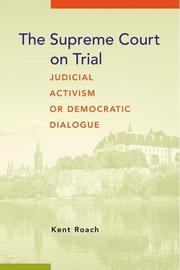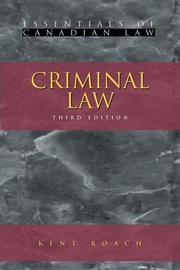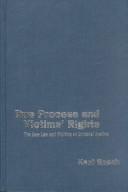| Listing 1 - 10 of 29 | << page >> |
Sort by
|
Book
ISBN: 9781107057074 9781107298002 9781107684003 1107057078 1107684005 1316358895 1316360091 1316360695 1316359492 1107298008 1316384691 1316379299 1316382893 9781316384695 9781316360095 9781316359495 9781316360699 Year: 2015 Publisher: Cambridge
Abstract | Keywords | Export | Availability | Bookmark
 Loading...
Loading...Choose an application
- Reference Manager
- EndNote
- RefWorks (Direct export to RefWorks)
Terrorism law is as international as it is regionally distinct and as difficult to define as it is essential to address. Given recent pressures to harmonize terrorism laws from international organizations like the United Nations Security Council, the Financial Action Task Force, and the Council of Europe, this book presents readers with an up-to-date assessment of terrorism law across the globe. Covering twenty-two jurisdictions across six continents, the common framework used for each chapter facilitates national comparisons of a range of laws including relevant criminal, administrative, financial, secrecy, and military laws. Recognizing that similar laws may yield different outcomes when transplanted into new contexts, priority of place is given to examples of real-world application. Including a thematic introduction and conclusion, this book will help to establish comparative counter-terrorism law as an emerging discipline crossing the boundaries of domestic and international law.
Terrorism --- Prevention&delete& --- Law and legislation --- Prevention --- Anti-terrorism --- Antiterrorism --- Counter-terrorism --- Counterterrorism --- Acts of terrorism --- Attacks, Terrorist --- Global terrorism --- International terrorism --- Political terrorism --- Terror attacks --- Terrorist acts --- Terrorist attacks --- World terrorism --- Direct action --- Insurgency --- Political crimes and offenses --- Subversive activities --- Political violence --- Terror --- War on Terrorism, 2001-2009 --- Etats-Unis --- Canada --- Colombie --- Brésil --- Espagne --- Croatie --- Slovénie --- République tchèque --- Israël --- Japon --- Singapour --- Royaume-Uni --- Suisse --- Belgique --- Italie --- Portugal --- Grèce --- Pologne --- Roumanie --- Afrique du Sud --- Chine --- Australie --- Law and legislation. --- Prevention.
Book
ISBN: 9781107006164 9781139003537 9780521185059 Year: 2011 Publisher: Cambridge Cambridge University Press
Abstract | Keywords | Export | Availability | Bookmark
 Loading...
Loading...Choose an application
- Reference Manager
- EndNote
- RefWorks (Direct export to RefWorks)
Book
ISBN: 110722148X 1139124862 1283298600 1139123386 9786613298607 1139003534 1139117637 1139128299 1139113275 1139115464 9781139128292 9781139003537 9781139117630 9781283298605 9781139115469 9781107006164 1107006163 9780521185059 052118505X 9781139124867 9781139123389 6613298603 9781139113274 Year: 2011 Publisher: Cambridge New York Cambridge University Press
Abstract | Keywords | Export | Availability | Bookmark
 Loading...
Loading...Choose an application
- Reference Manager
- EndNote
- RefWorks (Direct export to RefWorks)
"This book examines the responses of the United Nations, the United States, the United Kingdom, Australia and Canada responded to 9/11. It also examines how Egypt, Syria, Israel, Singapore and Indonesia had to do comparatively little to respond. The book provides a creitical take on how the United Nations promoted terrorism financing laws and the regulation of speech associated with terrorism while failing to agree on a definition of terrorism or the importance of repecting human rights while combating terrorism. It assesses some failures and challenges of counter-terrorism"--
September 11 Terrorist Attacks, 2001. --- Terrorism --- Acts of terrorism --- Attacks, Terrorist --- Global terrorism --- International terrorism --- Political terrorism --- Terror attacks --- Terrorist acts --- Terrorist attacks --- World terrorism --- Direct action --- Insurgency --- Political crimes and offenses --- Subversive activities --- Political violence --- Terror --- 9/11 Terrorist Attacks, 2001 --- 911 Terrorist Attacks, 2001 --- Attack on America, 2001 (September 11 Terrorist Attacks) --- Nine-Eleven Terrorist Attacks, 2001 --- Pentagon-World Trade Center Terrorist Attacks, 2001 --- Sept. 11 Terrorist Attacks, 2001 --- September 11 Terror Attacks, 2001 --- September 11 Terrorism, 2001 --- Terrorist Attacks, September 11, 2001 --- World Trade Center-Pentagon Terrorist Attacks, 2001 --- Hijacking of aircraft --- Prevention. --- Law --- General and Others
Book
ISBN: 1108283616 9781108283618 9781108417877 9781108405973 1108286976 1108284817 1108417876 Year: 2021 Publisher: Cambridge Cambridge University Press
Abstract | Keywords | Export | Availability | Bookmark
 Loading...
Loading...Choose an application
- Reference Manager
- EndNote
- RefWorks (Direct export to RefWorks)
An innovative book that provides fresh insights into the neglected field of remedies in both international and domestic human rights law. Providing an overarching two-track theory, it combines remedies to compensate and prevent irreparable harm to litigants with a more dialogic approach to systemic remedies. It breaks new ground by demonstrating how proportionality principles can improve remedial decision-making and avoid reliance on either strong discretion or inflexible rules. It draws on the latest jurisprudence from the European and Inter-American Courts of Human Rights and domestic courts in Australia, Canada, India, New Zealand, Hong Kong, South Africa, the United Kingdom and the United States. Separate chapters are devoted to interim remedies, remedies for laws that violate human rights, damages, remedies in the criminal process, declarations and injunctions in institutional cases, remedies for violations of social and economic rights and remedies for violations of Indigenous rights.
Human rights. --- Remedies (Law) --- Liability for human rights violations --- International criminal law --- Criminal law, International --- ICL (International criminal law) --- Criminal law --- International law --- Criminal jurisdiction --- International crimes --- Liability (Law) --- Civil remedies --- Code remedies --- Actions and defenses --- Civil procedure --- Basic rights --- Civil rights (International law) --- Human rights --- Rights, Human --- Rights of man --- Human security --- Transitional justice --- Truth commissions --- Law and legislation --- Liability for human rights violations. --- International criminal law. --- Political philosophy. Social philosophy --- Droits de l'homme --- Voies de droit --- Violation des droits de l'homme --- Droit international pénal. --- Responsabilité. --- Droit international pénal. --- Responsabilité.

ISBN: 1552210545 Year: 2001 Publisher: Toronto : Irwin Law,
Abstract | Keywords | Export | Availability | Bookmark
 Loading...
Loading...Choose an application
- Reference Manager
- EndNote
- RefWorks (Direct export to RefWorks)
Political questions and judicial power --- Judicial process --- Politique et pouvoir judiciaire --- Processus judiciaire --- Canada.

ISBN: 155221091X Year: 2004 Publisher: Toronto, ON : Irwin Law,
Abstract | Keywords | Export | Availability | Bookmark
 Loading...
Loading...Choose an application
- Reference Manager
- EndNote
- RefWorks (Direct export to RefWorks)
Book
ISBN: 1552210413 Year: 2000 Publisher: Toronto Irwin Law
Abstract | Keywords | Export | Availability | Bookmark
 Loading...
Loading...Choose an application
- Reference Manager
- EndNote
- RefWorks (Direct export to RefWorks)

ISBN: 9781442674127 1442674121 080200931X 0802079016 9780802009319 9780802079015 Year: 1999 Publisher: Toronto, Ont. Buffalo, N.Y. University of Toronto Press
Abstract | Keywords | Export | Availability | Bookmark
 Loading...
Loading...Choose an application
- Reference Manager
- EndNote
- RefWorks (Direct export to RefWorks)
Book
ISBN: 1668023687 Year: 2023 Publisher: New York : Simon & Schuster,
Abstract | Keywords | Export | Availability | Bookmark
 Loading...
Loading...Choose an application
- Reference Manager
- EndNote
- RefWorks (Direct export to RefWorks)
A top legal scholar explains Canada's national tragedy of wrongful convictions, how anyone could be caught up in them, and what we can do to safeguard justice.Canada's legal system has a serious problem: a significant but unknown number of people have been convicted for crimes they didn't commit. There are famous cases of wrongful convictions, such as David Milgaard and Donald Marshall Jr., where the system convicted the wrong person for murder. But there are lesser-known cases: people who feel they have no option but to plead guilty, and people convicted of crimes that were imagined by experts or the police that never, in fact, happened.Kent Roach, cofounder of the Canadian Registry of Wrongful Convictions, award-winning author, and law professor, has dedicated his illustrious career to documenting flaws in our justice system. His work reveals that the burden of wrongful convictions falls disproportionately on the disadvantaged, including Indigenous and racialized people, those with cognitive issues, single mothers, and the poor.Wrongfully Convicted raises awareness about wrongful convictions at a time when DNA exonerations are less frequent and the memories of most famous wrongful convictions are fading. Roach makes a compelling case for change that governments have so far lacked the courage to make. They include better legislative regulation of police and forensic experts and the creation of a permanent and independent federal commission both to investigate wrongful convictions and their multiple causes.Roach's research and vast knowledge point to systemic failings in our legal system. But he also outlines vital changes that can better prevent and correct wrongful convictions. Until we do, many of the wrongfully convicted are still waiting for the promise of justice. It is an issue that affects all Canadians.
Murder --- Criminology --- Criminal Law --- True Crime --- Social Science --- Law
Book
Abstract | Keywords | Export | Availability | Bookmark
 Loading...
Loading...Choose an application
- Reference Manager
- EndNote
- RefWorks (Direct export to RefWorks)
| Listing 1 - 10 of 29 | << page >> |
Sort by
|

 Search
Search Feedback
Feedback About UniCat
About UniCat  Help
Help News
News